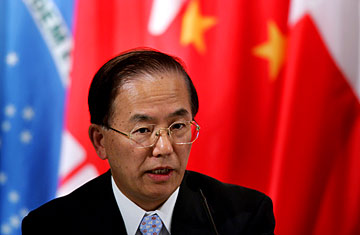
Bank of Japan Deputy Governor Toshiro Muto at the 2005 International Monetary Conference in Beijing
Temporarily averting what could become an embarrassing vacancy at the top of the world's second-largest economy, Japan's leadership yesterday named its choice for a new central bank chief: Toshiro Muto, currently deputy governor of the Bank of Japan. The nomination by Prime Minister Yasuo Fukuda surprised no one—Muto for months has been considered the front runner for the post—but it's still far from certain that he'll get the job as governor of the Bank of Japan.
That's because Muto must be approved by Japan's parliament—and some opposition party politicians say he's the wrong man for the job. Members of the Democratic Party of Japan (DPJ), which controls the upper house of the Diet, complain that Muto, a career bureaucrat who has spent some 35 years in the Ministry of Finance, will be too cozy with Fukuda's administration at a time when the central bank needs to exercise leadership and independence. After growing relatively briskly over the last five years, Japan's economy now appears to be slipping into a malaise and possibly a recession. "Muto is seen to be close to the government and to the Ministry of Finance," says Lehman Brothers chief economist for Japan Kenichi Kawasaki. "You can imagine Muto's potential sympathy toward those you might call his schoolmates." Although he calls Muto a "smart, top MOF guy," Kawasaki added he is "more like a lawyer than an economist...It's a pity that there's not a stronger candidate."
Others see Muto as a steady, experienced hand and a pragmatic choice to replace current Bank of Japan governor Toshihiko Fukui, 72, who whose five-year term ends March 19. The University of Tokyo graduate is "an extremely competent administrator who ensures consistency," says Jesper Koll, Japan director for Singapore-based Tantallon Capital. During his five-year term as deputy governor at the Bank of Japan, Muto, 64, typically voted in line with his boss, Fukui, at policy meetings. Even though Japan faces "stagflation"—a slowing economy combined with higher inflation—Muto isn't expected to do anything radical. He'll probably leave interest rates at the current level of 0.5%, at least in the short term. "The BOJ has not once acted pro-actively in its history," Koll notes. "It has done too little, too late."
The same might be said of Japan's parliament, which has been plagued by squabbling between the ruling Liberal Democratic Party of Japan (LDP), which controls the lower house, and the DPJ, whose members won a surprise majority in the upper house in elections last July. With Fukui's departure looming, politicians have been unable to reach agreement on a successor, with some DPJ lawmakers saying they prefer former deputy Central Bank governor Yutaka Yamaguchi. Business leader Mikio Wakatsuki, chairman of AXA Life Insurance of Japan, told reporters this week that it was "a national disgrace that this issue remains unresolved."
But DPJ lawmaker Masaharu Nakagawa, the DPJ's finance spokesman and a member of the lower house budget committee, says his party is not about to roll over. Nakagawa says he favors a central banker who has shown leadership, not someone who consistently engages in "consensus making." Muto is scheduled to be questioned in parliament on March 11. The clock is ticking.
With reporting by Yuki Oda
